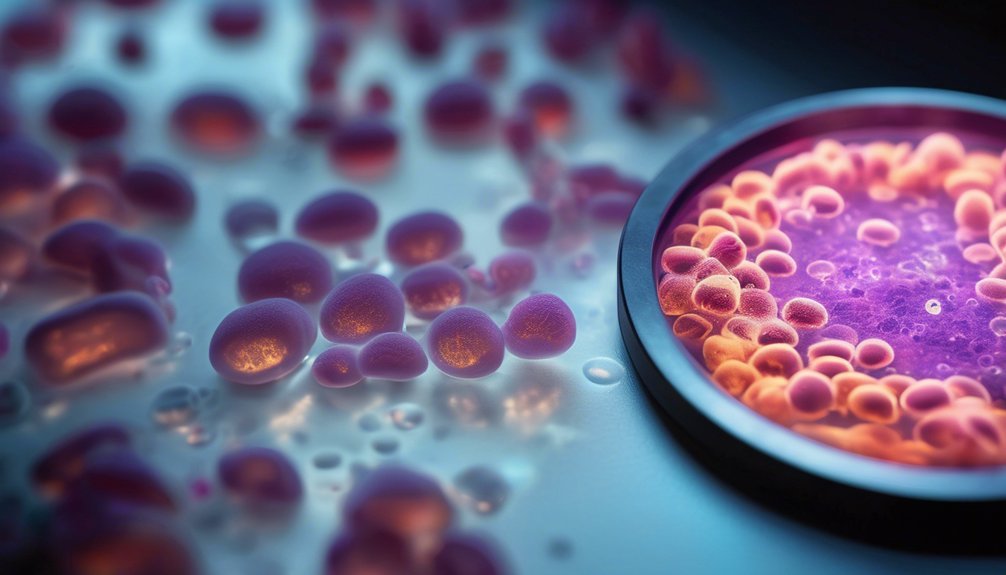As a cancer patient, you must be aware of the significance of maintaining optimal Vitamin D levels. The impact of Vitamin D deficiency on your health and treatment outcomes is substantial, raising concerns about potential risks and complications. Understanding the interplay between Vitamin D and cancer can provide valuable insights into improving your prognosis and overall well-being. By exploring strategies to address this deficiency, you can take proactive steps towards enhancing your treatment response and survival rates.
Key Takeaways
- Up to 70% of cancer patients have Vitamin D deficiency.
- Deficiency impacts immune function in cancer patients.
- Low levels increase cancer risk and affect treatment outcomes.
- Monitoring and supplementation are crucial for managing deficiency.
- Adequate levels improve prognosis and survival rates.
Importance of Vitamin D
Understanding the crucial role that Vitamin D plays in maintaining overall health is essential, especially for cancer patients. Vitamin D isn't just about bone health; it significantly impacts immune function, making it a vital nutrient in cancer care.
Adequate levels of Vitamin D are essential for maintaining strong and healthy bones. It helps in the absorption of calcium and phosphorus, crucial minerals for bone strength. Moreover, Vitamin D plays a key role in regulating the immune system, helping the body fight off infections and diseases.
For cancer patients, whose immune systems are often compromised due to the disease itself or treatments like chemotherapy, ensuring optimal levels of Vitamin D is even more critical. Research has shown that Vitamin D deficiency is common in cancer patients and is associated with poorer outcomes.
Therefore, monitoring and supplementing Vitamin D levels in cancer patients can potentially improve their bone health and support their immune function, contributing to better overall health during their cancer journey.
Prevalence in Cancer Patients
In cancer patients, the prevalence of Vitamin D deficiency is a significant concern that warrants attention. Several risk factors contribute to this issue, such as decreased sunlight exposure due to illness, limited dietary intake, impaired absorption, and certain cancer treatments affecting Vitamin D metabolism. Research suggests that up to 70% of cancer patients may have insufficient levels of Vitamin D, which can impact their overall health and treatment outcomes.
To address Vitamin D deficiency in cancer patients, treatment options include supplementation with Vitamin D3, regular monitoring of Vitamin D levels, and encouraging safe sun exposure or dietary changes. It's crucial to consult healthcare professionals to determine the appropriate dosage and frequency of supplementation tailored to individual needs.
Adequate Vitamin D levels have been associated with improved immune function, reduced inflammation, and potentially better treatment responses in cancer patients.
Impact on Cancer Risk

With Vitamin D deficiency being a prevalent concern among cancer patients, it's essential to understand its impact on cancer risk. Vitamin D plays a crucial role in cell growth regulation, immune function, and inflammation modulation, all of which are closely linked to cancer development. Here are some key points to consider:
- Prevention strategies: Adequate levels of Vitamin D have been associated with a lower risk of certain cancers, such as colorectal, breast, and prostate cancers. Incorporating Vitamin D-rich foods, supplements, and safe sun exposure can help maintain optimal levels and potentially reduce cancer risk.
- Risk factors: Individuals with low Vitamin D levels may have an increased risk of developing certain types of cancer. Factors such as age, skin pigmentation, geographical location, and lifestyle habits can influence Vitamin D status.
- Regular screening for Vitamin D levels and addressing deficiencies early on can be crucial in managing cancer risk.
Understanding the impact of Vitamin D deficiency on cancer risk can guide healthcare providers in implementing targeted prevention strategies and interventions to support overall health and well-being in cancer patients.
Influence on Treatment Outcomes
Vitamin D deficiency can significantly impact treatment outcomes in cancer patients. Research has shown that low levels of vitamin D are associated with poorer treatment responses in cancer patients undergoing therapy. Adequate vitamin D levels have been linked to improved treatment response rates, including better outcomes in terms of tumor shrinkage and disease control.
Additionally, studies have indicated that cancer patients with sufficient vitamin D levels tend to have higher survival rates compared to those with vitamin D deficiency.
Having optimal levels of vitamin D can enhance the effectiveness of treatments such as chemotherapy, radiation therapy, and immunotherapy. It plays a crucial role in modulating the immune system and supporting cellular processes involved in fighting cancer. Therefore, ensuring adequate vitamin D levels through supplementation or sunlight exposure may contribute to better treatment responses and ultimately improve survival rates in cancer patients.
It's essential for healthcare providers to monitor and address vitamin D deficiency in cancer patients to optimize treatment outcomes and enhance overall well-being.
Relationship With Prognosis

The presence of vitamin D deficiency in cancer patients shows a significant correlation with their overall prognosis. Studies have indicated that low levels of vitamin D in cancer patients can impact survival rates and disease progression significantly.
- Survival Rates: Research suggests that cancer patients with adequate levels of vitamin D tend to have better survival outcomes compared to those with a deficiency. Adequate levels of vitamin D have been associated with improved overall survival rates in various types of cancer.
- Disease Progression: Vitamin D deficiency in cancer patients has been linked to a higher risk of disease progression. Patients with low levels of vitamin D may experience faster disease progression and potentially poorer treatment outcomes.
- Clinical Implications: Monitoring and addressing vitamin D levels in cancer patients could be crucial in improving their prognosis. Ensuring optimal vitamin D levels through supplementation or sunlight exposure might positively impact survival rates and slow down disease progression.
Side Effects of Deficiency
Frequently overlooked but crucial to consider are the potential side effects of vitamin D deficiency in cancer patients. Vitamin D deficiency can have significant implications on the health and outcomes of cancer patients. Long term consequences of this deficiency may include weakened immune function, increased risk of infections, impaired wound healing, and decreased bone density leading to a higher susceptibility to fractures. To effectively manage this deficiency, it is essential to recognize the symptoms and implement prevention strategies.
| Symptoms | Prevention Strategies | Management Options |
|---|---|---|
| Fatigue | Regular sunlight exposure | Vitamin D supplements |
| Muscle weakness | Vitamin D-rich diet | Intramuscular injections |
| Bone pain | Fortified foods | Topical vitamin D creams |
Recognizing these symptoms early and taking appropriate measures can help prevent the long-term consequences of vitamin D deficiency in cancer patients. By incorporating prevention strategies and management options, healthcare providers can support patients in maintaining optimal vitamin D levels and potentially improve their overall health outcomes.
Screening Recommendations

Screening for vitamin D levels is a crucial component of comprehensive care for cancer patients. Ensuring adequate levels of vitamin D can positively impact treatment outcomes and overall well-being. To optimize screening practices, consider the following:
- Patient Education: Emphasize the importance of regular vitamin D level assessments to patients undergoing cancer treatment. Educate them on the role of vitamin D in immune function and bone health, highlighting its significance in the context of cancer care.
- Healthcare Provider Awareness: Encourage healthcare providers to routinely screen for vitamin D levels in cancer patients. Raise awareness about the prevalence of vitamin D deficiency in this population and the potential impact on treatment efficacy and quality of life.
- Collaborative Approach: Foster collaboration between patients, oncologists, and primary care providers to monitor and address vitamin D status throughout the cancer care continuum.
Establish clear communication channels for sharing screening results and implementing appropriate interventions.
Dietary Sources and Supplements
Amidst the array of considerations in cancer care, understanding the role of dietary sources and supplements in maintaining optimal vitamin D levels is paramount. Vitamin D is naturally found in a few foods such as fatty fish and egg yolks, but the primary source is sunlight exposure. Fortified foods like milk, cereals, and orange juice are also essential dietary sources. Supplements can be beneficial, especially for individuals with limited sun exposure or those with malabsorption issues.
The absorption mechanisms of vitamin D are intricate; it's absorbed in the small intestine with the help of bile salts. Bioavailability varies between different forms of supplements, with D3 being more effective than D2.
The recommended daily intake of vitamin D for cancer patients is generally higher than for the general population, often necessitating supplementation to achieve adequate levels.
Incorporating a variety of sources, including fortified foods and supplements, can help individuals meet their daily vitamin D requirements, ensuring optimal levels for overall health and potentially supporting cancer treatment outcomes.
Sunlight Exposure Guidelines

Considering the significant role of sunlight exposure in maintaining adequate vitamin D levels, it's crucial for cancer patients to be mindful of following appropriate guidelines. Safe exposure to sunlight is essential for synthesizing vitamin D, but it's important to balance this with the risk of skin damage and cancer. Here are some key guidelines to help you optimize your sunlight exposure:
- Time of Day: Aim to get sunlight exposure in the early morning or late afternoon to reduce the risk of sunburn and skin damage.
- Duration: Start with short periods of sun exposure, gradually increasing the time to about 10-30 minutes, depending on your skin type and the intensity of the sun.
- Skin Protection: While getting sunlight, ensure you protect your skin with sunscreen, hats, and sunglasses to prevent harmful UV radiation exposure.
Management Strategies
Implementing effective management strategies is crucial in addressing vitamin D deficiency in cancer patients. Treatment implications involve supplementing with vitamin D to reach optimal levels, especially in individuals undergoing cancer treatment that may further deplete their vitamin D stores. Prevention strategies include regular monitoring of vitamin D levels through blood tests and adjusting supplements accordingly. Patient education plays a vital role in ensuring compliance with vitamin D supplementation and understanding the importance of maintaining adequate levels for overall health and well-being.
Healthcare provider collaboration is essential in managing vitamin D deficiency in cancer patients. Oncologists and primary care physicians should work together to develop a comprehensive plan tailored to the patient's specific needs and treatment regimen. Regular communication between healthcare providers can help ensure that vitamin D levels are monitored closely and adjustments are made as needed to support the patient's overall health and treatment outcomes.
Health Benefits of Adequate Levels

Given the significance of managing vitamin D deficiency in cancer patients, it's essential to recognize the health benefits of maintaining adequate levels. Adequate levels of vitamin D play a crucial role in supporting your overall health and well-being.
Here are some key health benefits associated with maintaining optimal levels of vitamin D:
- Enhanced Immune Function: Adequate levels of vitamin D are essential for a robust immune system. Vitamin D helps regulate immune responses, reducing inflammation and supporting the body's defense against infections and diseases.
- Optimal Bone Health: Vitamin D is vital for calcium absorption and bone mineralization. Maintaining adequate levels of vitamin D helps prevent conditions like osteoporosis and ensures healthy bone development and maintenance.
- Overall Wellness: Beyond immune function and bone health, adequate levels of vitamin D have been linked to improved mood, cardiovascular health, and muscle function. Ensuring you have sufficient vitamin D levels can contribute to your overall wellness and quality of life.
Future Research Directions
To advance our understanding of the relationship between vitamin D deficiency and cancer outcomes, future research should prioritize investigating the impact of targeted vitamin D supplementation regimens on treatment efficacy and patient survival rates. Genetic factors play a crucial role in how individuals metabolize and utilize vitamin D, affecting its efficacy in cancer prevention and treatment. Therefore, exploring how genetic variations influence responses to vitamin D supplementation in cancer patients is essential for personalized medicine approaches.
Clinical trials focusing on different cancer types and stages are necessary to gather robust data on the effects of vitamin D supplementation. These trials should consider factors such as baseline vitamin D levels, dosing regimens, and duration of supplementation to determine the optimal strategies for improving cancer treatment outcomes.
Frequently Asked Questions
Can Vitamin D Deficiency Worsen Cancer Symptoms?
When you lack sufficient vitamin D, it can potentially impact your immune response and contribute to tumor growth. Maintaining adequate levels of this essential nutrient is crucial for supporting your body's ability to fight off diseases and manage cell growth.
If you suspect a deficiency, consult your healthcare provider for proper assessment and recommendations on how to optimize your vitamin D levels to potentially help alleviate cancer symptoms.
Does Vitamin D Deficiency Affect Cancer Treatment Response?
If you're wondering if vitamin D deficiency impacts cancer treatment response, it's important to consider its role in immune function. Adequate vitamin D levels can enhance your immune system's ability to fight cancer cells and support treatment outcomes.
Research suggests that maintaining optimal vitamin D levels may positively influence how your body responds to cancer therapies, potentially improving their effectiveness.
Prioritizing your vitamin D status could be beneficial for your overall treatment journey.
How Does Vitamin D Deficiency Impact Cancer Recurrence?
When vitamin D levels are low, cancer recurrence risk may rise due to impacts on immune function and tumor growth.
Vitamin D plays a vital role in regulating immune responses and inhibiting tumor cell proliferation. Deficiency may compromise your body's ability to fight cancer cells and suppress tumor growth, potentially leading to increased chances of cancer recurrence.
Maintaining adequate levels of vitamin D is crucial for supporting your immune system and reducing cancer recurrence risk.
Can Vitamin D Deficiency Affect Cancer Survival Rates?
Vitamin D supplementation may impact cancer survival rates by potentially improving long-term outcomes. Research suggests that maintaining adequate vitamin D levels could be beneficial for overall health and may play a role in supporting cancer treatment effectiveness.
Consider discussing with your healthcare provider about the potential benefits of vitamin D supplementation as part of a comprehensive approach to managing cancer and enhancing survival rates.
Is There a Link Between Vitamin D Deficiency and Cancer Metastasis?
When it comes to cancer metastasis, staying vigilant about potential risk factors is crucial. Taking preventive measures against vitamin D deficiency could play a significant role in reducing the metastasis risk associated with cancer.
Research suggests that maintaining adequate levels of vitamin D may help in slowing down cancer spread. Consulting with healthcare providers about optimizing your vitamin D levels can be a proactive step in your cancer treatment journey.
Conclusion
So, next time you're basking in the sun, remember that vitamin D deficiency is no joke, especially for cancer patients. It's ironic how something as simple as sunlight can have such a profound impact on treatment outcomes and prognosis. Keep those levels up, because when it comes to fighting cancer, every little ray of sunshine counts.





